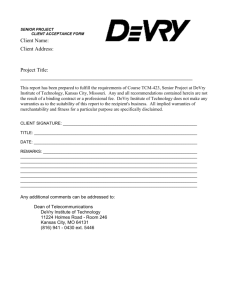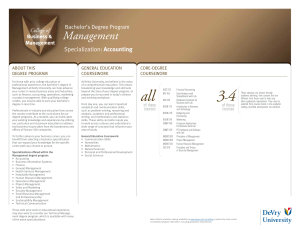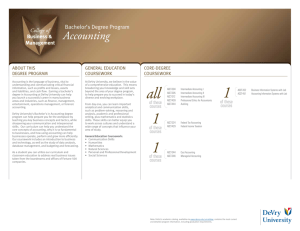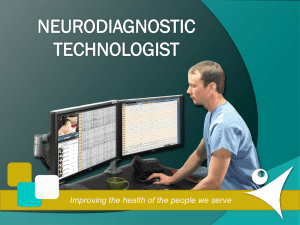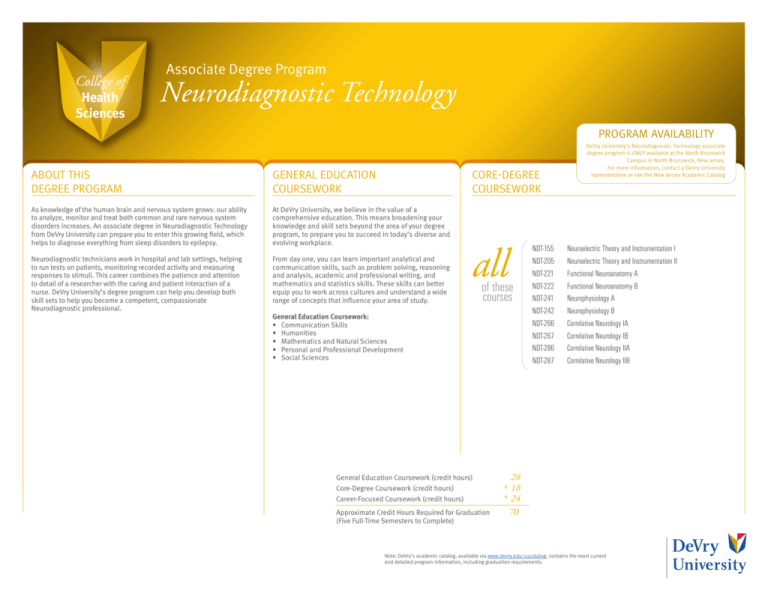
College of
Health
Sciences
Associate Degree Program
Neurodiagnostic Technology
program availability
core-degree
coursework
about this
degree program
general education
coursework
As knowledge of the human brain and nervous system grows: our ability
to analyze, monitor and treat both common and rare nervous system
disorders increases. An associate degree in Neurodiagnostic Technology
from DeVry University can prepare you to enter this growing field, which
helps to diagnose everything from sleep disorders to epilepsy.
At DeVry University, we believe in the value of a
comprehensive education. This means broadening your
knowledge and skill sets beyond the area of your degree
program, to prepare you to succeed in today’s diverse and
evolving workplace.
Neurodiagnostic technicians work in hospital and lab settings, helping
to run tests on patients, monitoring recorded activity and measuring
responses to stimuli. This career combines the patience and attention
to detail of a researcher with the caring and patient interaction of a
nurse. DeVry University’s degree program can help you develop both
skill sets to help you become a competent, compassionate
Neurodiagnostic professional.
From day one, you can learn important analytical and
communication skills, such as problem solving, reasoning
and analysis, academic and professional writing, and
mathematics and statistics skills. These skills can better
equip you to work across cultures and understand a wide
range of concepts that influence your area of study.
all
of these
courses
General Education Coursework:
• Communication Skills
• Humanities
• Mathematics and Natural Sciences
• Personal and Professional Development
• Social Sciences
General Education Coursework (credit hours)
Core-Degree Coursework (credit hours)
Career-Focused Coursework (credit hours)
Approximate Credit Hours Required for Graduation
(Five Full-Time Semesters to Complete)
NDT-155 NDT-205 NDT-221 NDT-222 NDT-241 NDT-242 NDT-266 NDT-267 NDT-286 NDT-287 DeVry University’s Neurodiagnostic Technology associate
degree program is ONLY available at the North Brunswick
Campus in North Brunswick, New Jersey.
For more information, contact a DeVry University
representative or see the New Jersey Academic Catalog
Neuroelectric Theory and Instrumentation I
Neuroelectric Theory and Instrumentation II
Functional Neuroanatomy A
Functional Neuroanatomy B
Neurophysiology A
Neurophysiology B
Correlative Neurology IA
Correlative Neurology IB
Correlative Neurology IIA
Correlative Neurology IIB
28
+ 18
+ 24
70
Note: DeVry’s academic catalog, available via www.devry.edu/uscatalog, contains the most current
and detailed program information, including graduation requirements.
Associate Degree Program
College of
Media Arts &
Technology
Neurodiagnostic Technology
careers in
neurodiagnostics
knowledge
and skills
Neurodiagnostics is an area of medicine that studies the human nervous system
by recording and analyzing bioelectrical activity. Common diagnostic tools used by
technicians include, electroencephalographs (which record brain waves) electromyographs
(which help diagnose muscle and nerve disease and damage) and polysomnographs
(which monitor sleep activity to help with insomnia and other sleep disorders).
Functional Neuroanatomy — Learn the structural
DeVry University’s Neurodiagnostic Technology associate degree program was designed
to help provide you the technical training to run and monitor typical diagnostic tests as
well as the communication skills to interact effectively, ethically and compassionately with
patients, family members and staff.
Correlative Neurology — Study disorders of
Graduates of DeVry University’s Neurodiagnostic Technology associate degree program
may consider careers including:
• Neurodiagnostic Technologist
• Polysomnographic Technologist
According to O*NET OnLine, using data from the Bureau of Labor Statistics, employment
of neurodiagnostic technicians is expected to grow between 20 and 28 percent from
2010 to 2020, which is faster than the average for all occupations.1 According to BLS’s
Occupational Outlook Handbook, “although hospitals are expected to continue to be the
major employer of clinical laboratory workers, employment is expected also to grow rapidly
in medical and diagnostic laboratories, offices of physicians and all other ambulatory
healthcare services.”2
organization of the central nervous system, including the
skull and vertebral column, major subdivisions of the brain
and spinal cord, and circulation of blood and cerebrospinal
fluid.
muscle, the myoneural junction, peripheral nerves, nerve
roots, the spinal cord and the autonomic nervous system.
career-focused
coursework
all
of these
courses
NDT-256 NDT-257 NDT-276 NDT-277 NDT-296 NDT-297 Clinical Practicum IA
Clinical Practicum IB
Clinical Practicum IIA
Clinical Practicum IIB
Clinical Practicum IIIA
Clinical Practicum IIIB
Neurophysiology — Study the underlying
physiological concepts and functioning of the central,
peripheral and autonomic nervous systems.
Correlative Neurology — Explore diseases of the
nervous system by level of the nervous system involved in
the disease process. Focus on clinical manifestations of
disease in each etiologic category.
Clinical Practicum — Experience a clinical
environment, rotating through multiple disciplines:
electroencephalography (EEG), polysomnography (PSG),
evoked potential (EP), intraoperative monitoring (IOM),
epilepsy monitoring and nerve conduction studies (NCSs)
Monitor Operations3 — Observe machines to ensure
they are functioning properly.
Analyze Data or Information3 — Identify the
O*NET OnLine, Neurodiagnostic Technologists, on the Internet at www.online.onetcenter.org/link/summary/29-2099.01.
(visited November 1, 2012).
2
Bureau of Labor Statistics, U.S. Department of Labor, Occupational Outlook Handbook, 2010-12 Edition, Clinical
Laboratory Technologists and Technicians, on the Internet at www.bls.gov/oco/ocos096.htm (visited November 1, 2012).
3
O*NET OnLine, Neurodiagnostic Technologists, on the Internet at www.online.onetcenter.org/link/summary/29-2099.01.
(visited November 1, 2012).
1
underlying principles, reasons or facts of information by
breaking down information or data into separate parts.
Document/Record Information3 — Enter,
transcribe, store or maintain information in written or
electronic form.
Process Information3 — Compile codes, categories,
calculations, tabulations and audits, or verify information
or data.
In New York, DeVry University operates as DeVry College of New York.
Program and course requirements and availability vary by location. Some courses may be
available online only. Refer to the current academic catalog for more detailed information.
DeVry University operates as DeVry Institute of Technology in Calgary, Alberta. DeVry is
certified to operate by the State Council of Higher Education for Virginia. AC0060. DeVry
University is authorized for operation by the THEC, www.state.tn.us/thec. Nashville
Campus – 3343 Perimeter Hill Dr., Nashville, TN 37211. Trademarks herein are property of
their respective owners. ©2013 DeVry Educational Development Corp. All rights reserved.
Version 1/15/13
For comprehensive consumer information, visit devry.edu/aendt
Visit DeVry.edu or call 888.DEVRY.04

